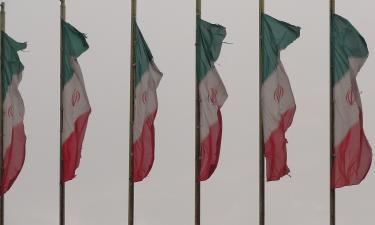How the US may destroy Israel? - By proxy!
by Hans Vogel

The tension between national sovereignty and the forces of globalization is becoming ever more acute. The US, as the main champion of globalization, however, is at the same time the champion of the most extreme form of nationalism, namely imperialism. In fact, Israel’s worst enemy is the very nation posing as its best friend. This means that Israel’s days are numbered.
Today, the United States government champions an extreme form of national sovereignty for itself. In clear violation of its international commitments and obligations (for instance under the provisions of the WTO-treaty), the US government effectively prevents foreigners from investing in the US economy. Foreigners (Chinese) have been barred from purchasing an interest in US port activities and from taking over a US oil company. These planned takeovers were deemed a threat to US national security. Similarly, the defence and energy industries in the US have long been off-limits for foreign investors.
In 1996, the Helms-Burton Act came into effect, one of the most blatant attempts to give US laws an extraterritorial validity. Illegal from the perspective of international law, the Helms-Burton Act holds CEO’s of foreign companies personally responsible for doing business with Cuban firms owning US property nationalized in 1959. Indeed, the support for these policies is not a recent phenomenon, nor is it narrow-based. Therefore, one must assume it to be a permanent characteristic of US policy, and one that will only strengthen and be more prominent in the future.
The US implicitly denies full sovereignty to any other nation but the US. Moreover, the US regularly intimidates other nations, even its closest allies, to bring their policies in line with US interests. Thus in 2005, Israel was forced to call off military cooperation with China over US fears that the Chinese might lay their hands on sensitive high technology. The Israelis even had to sack Amos Yaron, director general of the defence ministry, who was leading the China program. In April 2006 Trevor Taylor, an influential British defense specialist, wrote that cooperation with the US is impossible since the US will not recognize any other sovereignty but its own. This attitude is practically universal among them, and at last is beginning to put even long-time alliances at risk. Interestingly enough, this latest criticism came from Britain, the closest and oldest US ally (since 1939). If the US does not even trust the British any longer, who will they trust?
The root of the problem is that the US political leadership, together with leading intellectuals and businessmen, regard their country as God’s own. Although founded in the 1770s on universalist, humanistic and even masonic values and principles, subsequent politicians have introduced religious elements. The contradictory result is visible to anyone who has ever handled a dollar bill: it carries both masonic symbols and the motto “in God we trust.”
Humanistic values have until recently been a key element of US policy, but have been jettisoned by the Bush administration since it officially uses torture as a judicial tool against perceived foreign enemies. The Obama administration shows few signs of departing from this policy. Yet the claim to embodying universalist values, which the US has sustained ever since the foundation of the republic, still has not disappeared. US (universalist) ideals and values have found their way to the United Nations, the World Trade Organization and other forms of international cooperation among sovereign states and nations.
Since the end of the Cold War in 1989, the US has been the main champion of globalization. Indeed, what other nation could be better suited to this role than precisely the US, with its universalist roots, well-founded claims to represent universalist values and universal appeal?
The benefits of globalizationarespreadvery unevenly. There are two major beneficiaries: the US and China. Yet whereas China has behaved in a very modest fashion on the international political stage, the US has made a mockery of the very international organizations and treaties it has been so instrumental in creating. The conquest and colonization of Iraq, a sovereign state and a UN member, was carried out in sheer contempt of the UN. The US is still refusing to sign and ratify the Kyoto protocol, purporting to curtail worldwide environmental disaster. In their fight against Iraqi freedom fighters, US forces have since 2003 been violating most articles of the Geneva conventions on a daily basis.
The question is, why would the US behave in such a way? The answer is simple: the US believes it is the true international nation. They do not really need a UN, at least not when they cannot control it. The whole world is theirs, and who can really blame them for believing that? The whole world watches insipid US sitcoms and silly Hollywood cinema, everybody sips Coca Cola and other US sodas, which will end up giving you cancer in whatever form you drink them. Everybody eats McDonald’s hamburgers, which will make you sick, overweight and miserable, and cause heart failure. The whole world consumes the trash masquerading as US popular cultureand the whole world is destroying itself doing so. With people all over the world demonstrating such indifference to their own hearts, minds and stomachs, why would they care for something as alien and distant as the UN, or even their nation’s sovereignty?
Indeed, after the end of the Cold War and with the advent of full-fledged globalization, most national states have become weakened, if not vis-a-vis their citizens, than on the international level by delegating entire policy sections to supranational organizations, such as the EU member states have been doing. This is not surprising, since universalism and “globalization” are implicitly antithetical to nation states and nationalism.
On the other hand, there still remains a small number of powerful nation states with clearly independent foreign policy agendas. These include China (by the sheer weight of its population and the growth rate of its economy), Russia (on account of its nuclear armament and for being the successor to the Imperial USSR), France, Iran and Israel. Of these, Israel is arguably the most powerful. First, it can be considered one of the oldest nations on earth, since for 2,000 years the Jews, in spite of the persecutions and hardship of the diaspora, have maintained their identity. Secondly, Israel is the last best hope for Jews. They never want to have to leave again and therefore they will defend Israel’s independence and sovereignty at whatever cost. The size, quality and experience of the Israeli defense establishment are well known and need no elaboration here. It is an open secret that Israel possesses a vast nuclear arsenal and the means for delivering it.
Since it replaced France as Israel’s major ally in 1968, the US has become its closest foreign friend. It was Charles de Gaulle, however, who once remarked that France did not have friends, just interests. Thousands of years of history prove him right: nations may change their “friends,” but their interests remain the same. It is Israel’s prime concern to ensure its own survival, whereas the US will want to carry on globalization at an accelerated pace. Inevitably therefore, US-Israeli friendship must one day come to an end.
US anger at Iran (for having kicked the US out in 1979) is well-known. With more than 70 million inhabitants, Iran is among the most populous states of the Middle East (together with Egypt and Turkey). Successor to the ancient Iranian Empire (which even the Romans were never able to subdue), Iran is widely regarded as the leading Middle Eastern civilization. Moreover it is the central point of historical reference in the region. Iran has a booming economy and is sitting on a vast reservoir of oil. It is a rich country with a highly educated population and a strong middle class. Iran now has a thriving arms industry and manufactures its own tanks, fighters, missiles and ammunition. While it certainly has the technical capacity to build a nuclear bomb, it lacks the required fissile material. Meanwhile, it has developed an arsenal of chemical and biological weapons. Nor would it be a surprise to learn that some or all of the 250 missing nuclear warheads from the Ukraine are now in Iranian hands.
Since the US is the main proponent of globalism and universalism, it will eventually have to clash with Israel. That final showdown may not be as far off as we think. Since the conquest of Iraq in 2003, the US is firmly established and entrenched in the Middle East. It has become the strongest military power in the Middle East through its new Iraqi colony. Inevitably, its interests will collide with those of the two other local military powers, Israel and Iran. In order for the US to secure its colony and the control of local petroleum sources, it will need to keep the Arabs quiet. The best way to do so is to get rid of what Arabs hate most: the state of Israel.
Rumours about a possible US attack on Iran have not subsided since they first appeared a couple of years ago. It remains very tempting for the US to eliminate one of the two obstacles standing in the way of its total domination of the Middle East and its oil. After Iran has been wiped out, Israel will be the only state left in the region to challenge US policies. From a US point of view, this means that Israel needs to be eliminated as well.
Unconditional US support for Israel, repeatedly reaffirmed by all who come power in the US, is puzzling indeed. Israel has been perfectly able to defend itself in the past, and with its determination and nuclear arsenal it will be able to continue to do so in the future. The US has an impressive record of saving countries by destroying them. US commitment to the defence of Vietnam has crippled that country while today’s average Iraqi will be less than grateful to the US for “liberating” his country. What is the US really aiming at? The destruction of Israel? US official guarantees to Israel rather sound like a kiss of death. The US does not want rivals in the Middle East, certainly none with an agenda of their own. It is in the US national interest to take out these rivals as soon as possible.
Come to think of it, what better way in this respect for the US than to foment Israeli-Iranian animosity? The US may strike Iranian nuclear installations, but what will happen next? Who do you think the Iranians will focus their revenge on when attacked by the US? And who do you think Israel will fire its nuclear warheads at?
The new Israeli administration, led by hardliners, has now taken the lead in advocating tough treatment of Iran in order to persuade it to halt its nuclear program. The air is abuzz with rumors about Israeli plans to go it alone and attack Iran just by itself. If Israel were to attack Iran, the results would be terrible and it would expose Israel to Iranian reprisals. Indeed, Israel may well take out a big chunk of Iran's military potential, but in doing so, it would invite Iran to try answer in kind.
The latest sounds from Washington seem to suggest that the Obama administration wants Israel to tone down and abandon its aggressive rhetoric vis-à-vis Iran. However, prime minister Netanyahu does not appear to be a man to heed such advice. On the contrary, he may be pushed to do exactly what he is threatening to do: make sure Iran does not get a nuclear bomb.
I am afraid there seems to be little chance a violent clash between Israel and Iran can be avoided. Such a clash will probably eliminate both Israel and Iran from the Middle Eastern chess board. Indeed, it would be a strategic masterstroke for the US to eliminate its major military rivals in the Middle East by setting them up to destroy each other.
Subscribe to Pravda.Ru Telegram channel, Facebook, RSS!





